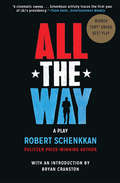- Table View
- List View
All the Way to the Tigers: A Memoir
by Mary MorrisFrom the author of Nothing to Declare, a new travel narrative examining healing, redemption, and what it means to be a solo woman on the road. <P><P>In the tradition of Wild by Cheryl Strayed and Eat, Pray, Love by Elizabeth Gilbert, Mary Morris turns a personal catastrophe into a rich, multilayered memoir full of personal growth, family history, and thrilling travel. <P><P>In February 2008 a casual afternoon of ice skating derailed the trip of a lifetime. Mary Morris was on the verge of a well-earned sabbatical, but instead she endured three months in a wheelchair, two surgeries, and extensive rehabilitation. <P><P>On Easter Sunday, when she was supposed to be in Morocco, Morris was instead lying on the sofa reading Death in Venice, casting her eyes over these words again and again: "He would go on a journey. Not far. Not all the way to the tigers." Disaster shifted to possibility and Morris made a decision. When she was well enough to walk again (and her doctor wasn't sure she ever would), she would go "all the way to the tigers." <P><P>So begins a three-year odyssey that takes Morris to India in search of the world's most elusive apex predator. Her first lesson: don't look for a tiger because you won't find it--you look for signs of a tiger. And all unseen tigers, hiding in the bush, are referred to as "she." Morris connects deeply with these magnificent and highly endangered animals, and her weeks on tiger safari also afford a new understanding of herself. <P><P>Written in over a hundred short chapters, All the Way to the Tigers offers an elegiac, wry, and wise look at a woman on the road and the glorious, elusive creature she seeks.
All the Way to the Top
by Annette Bay PimentelThis is the story of a little girl who just wanted to go, even when others tried to stop her. Jennifer Keelan was determined to make a change―even if she was just a kid. She never thought her wheelchair could slow her down, but the way the world around her was built made it hard to do even simple things. Like going to school, or eating lunch in the cafeteria. Jennifer knew that everyone deserves a voice! Then the Americans with Disabilities Act, a law that would make public spaces much more accessible to people with disabilities, was proposed to Congress. And to make sure it passed, Jennifer went to the steps of the Capitol building in Washington DC to convince them. And, without her wheelchair, she climbed. ALL THE WAY TO THE TOP!
All the Way: A Biography of Frank Sinatra 1915–1998
by Michael FreedlandFrom his rough beginnings to his early success as a crooner worshipped by bobby-soxers, Freedland's biography follows Sinatra's fall as a singer out of vogue and an actor labeled box-office poison, to his triumph as Oscar winner and entertainment legend.
All the Way: A Play
by Robert SchenkkanThis Tony Award–winning, “jaw-dropping political drama” chronicles LBJ’s fight for the Civil Rights Act and includes an introduction by Bryan Cranston (Variety). Winner of the 2014 Tony Award for Best Play, as well as Best Play awards from the New York Drama Critics’ Circle, the Outer Critics Circle, the Drama League, and numerous other awards, All the Way is a masterful exploration of politics and power from the Pulitzer Prize–winning playwright Robert Schenkkan. All the Way tells the story of the tumultuous first year of Lyndon Baines Johnson’s presidency. Thrust into power following the Kennedy assassination and facing an upcoming election, Johnson is nevertheless determined to end the legacy of racial injustice in America and rebuild it into the Great Society—by any means necessary. In order to pass the landmark 1964 Civil Rights bill, LBJ struggles to overpower an intransigent Congress while also attempting to forge a compromise with Martin Luther King, Jr., and navigate the increasingly fractious Civil Rights Movement. Breaking Bad star Bryan Cranston played President Johnson in the play’s celebrated Broadway production, for which he was awarded the Tony Award for Best Actor. In this edition, Cranston provides an illuminating and personal introduction.
All the Way: A Romancing Manhattan Novel (Romancing Manhattan #1)
by Kristen ProbyIn New York Times and USA Today bestselling author Kristen Proby’s brand new Romancing Manhattan series, three brothers get more than they bargain for as they practice law, balance life, and navigate love in and around New York City.Finn Cavanaugh is known for being a force to be reckoned with in the courtroom. He owns a successful law firm with his brother and brother-in-law in Manhattan. On the rare occasion that he has down time, he spends it at his home in Martha’s Vineyard. But when Finn’s troubled niece goes to stay with him for the summer in Martha’s Vineyard, he’s reluctant to take time off from work. That is, until he meets his beautiful new neighbor, London.London Watson is a Tony Award winning actress on Broadway. When tragedy strikes her family, leaving her alone and injured, she flees Manhattan for Martha’s Vineyard. Hoping she can figure out how to pick up the pieces of her life, London is convinced that she’ll never be able to return to the stage. But when she meets the charming young girl next door and her sexy uncle, they soon lure London out of her shell as she finally begins to heal from the wounds of her past. But when London feels confident enough to return to the spotlight, she’s dealt another devastating blow. Will the newfound love between London and Finn be enough to conquer all? Or will it be over before it has a chance to grow…?
All the Way: My Life in Four Quarters
by Joe NamathThe NFL icon who first brought show business to sports shares his life lessons on fame, fatherhood, and football. Three days before the 1969 Super Bowl, Joe Namath promised the nation that he would lead the New York Jets to an 18-point underdog victory against the seemingly invincible Baltimore Colts. When the final whistle blew, that promise had been kept. Namath was instantly heralded as a gridiron god, while his rugged good looks, progressive views on race, and boyish charm quickly transformed him - in an era of raucous rebellion, shifting social norms, and political upheaval - into both a bona fide celebrity and a symbol of the commercialization of pro sports. By 26, with a championship title under his belt, he was quite simply the most famous athlete alive. Although his legacy has long been cemented in the history books, beneath the eccentric yet charismatic personality was a player plagued by injury and addiction, both sex and substance. When failing knees permanently derailed his career, he turned to Hollywood and endorsements, not to mention a tumultuous marriage and fleeting bouts of sobriety, to try and find purpose. Now 74, Namath is ready to open up, brilliantly using the four quarters of Super Bowl III as the narrative backbone to a life that was anything but charmed. As much about football and fame as about addiction, fatherhood, and coming to terms with our own mortality, All the Way finally reveals the man behind the icon.
All the Ways Home
by Elsie Chapman"In All the Ways Home, Elsie Chapman gracefully explores the complexities of family and loss. The specificity in which Chapman narrates Kaede's journey in Japan is particularly satisfying. An insightful, compassionate, and honest look at a young boy's search for identity and home after the death of his mother."—Veera Hiranandani, author of Newbery Honor novel The Night DiarySometimes, home isn’t where you expect to find it.After losing his mom in a fatal car crash, Kaede Hirano--now living with a grandfather who is more stranger than family--developed anger issues and spent his last year of middle school acting out. Best-friendless and critically in danger repeating the seventh grade, Kaede is given a summer assignment: write an essay about what home means to him, which will be even tougher now that he's on his way to Japan to reconnect with his estranged father and older half-brother. Still, if there's a chance Kaede can finally build a new family from an old one, he's willing to try. But building new relationships isn’t as easy as destroying his old ones, and one last desperate act will change the way Kaede sees everyone--including himself. This is a book about what home means to us—and that there are many different correct answers.
All the Ways We Kill and Die: An Elegy for a Fallen Comrade, and the Hunt for His Killer
by Brian CastnerThe search for a friend’s killer is a riveting lesson in the way war has changed. The EOD--explosive ordnance disposal--community is tight-knit, and when one of their own is hurt, an alarm goes out. When Brian Castner, an Iraq War vet, learns that his friend and EOD brother Matt has been killed by an IED in Afghanistan, he goes to console Matt's widow, but he also begins a personal investigation. Is the bomb maker who killed Matt the same man American forces have been hunting since Iraq, known as the Engineer? In this nonfiction thriller Castner takes us inside the manhunt for this elusive figure, meeting maimed survivors, interviewing the forensics teams who gather post-blast evidence, the wonks who collect intelligence, the drone pilots and contractors tasked to kill. His investigation reveals how warfare has changed since Iraq, becoming individualized even as it has become hi-tech, with our drones, bomb disposal robots, and CSI-like techniques. As we use technology to identify, locate, and take out the planners and bomb makers, the chilling lesson is that the hunters are also being hunted, and the other side--from Al-Qaeda to ISIS-- has been selecting its own high-value targets.
All the Ways We Said Goodbye: A Novel of the Ritz Paris
by Karen White Lauren Willig Beatriz WilliamsThe New York Times bestselling authors of The Glass Ocean and The Forgotten Room return with a glorious historical adventure that moves from the dark days of two World Wars to the turbulent years of the 1960s, in which three women with bruised hearts find refuge at Paris’ legendary Ritz hotel.The heiress . . .The Resistance fighter . . . The widow . . .Three women whose fates are joined by one splendid hotelFrance, 1914. As war breaks out, Aurelie becomes trapped on the wrong side of the front with her father, Comte Sigismund de Courcelles. When the Germans move into their family’s ancestral estate, using it as their headquarters, Aurelie discovers she knows the German Major’s aide de camp, Maximilian Von Sternburg. She and the dashing young officer first met during Aurelie’s debutante days in Paris. Despite their conflicting loyalties, Aurelie and Max’s friendship soon deepens into love, but betrayal will shatter them both, driving Aurelie back to Paris and the Ritz— the home of her estranged American heiress mother, with unexpected consequences.France, 1942. Raised by her indomitable, free-spirited American grandmother in the glamorous Hotel Ritz, Marguerite “Daisy” Villon remains in Paris with her daughter and husband, a Nazi collaborator, after France falls to Hitler. At first reluctant to put herself and her family at risk to assist her grandmother’s Resistance efforts, Daisy agrees to act as a courier for a skilled English forger known only as Legrand, who creates identity papers for Resistance members and Jewish refugees. But as Daisy is drawn ever deeper into Legrand’s underground network, committing increasingly audacious acts of resistance for the sake of the country—and the man—she holds dear, she uncovers a devastating secret . . . one that will force her to commit the ultimate betrayal, and to confront at last the shocking circumstances of her own family history.France, 1964. For Barbara “Babs” Langford, her husband, Kit, was the love of her life. Yet their marriage was haunted by a mysterious woman known only as La Fleur. On Kit’s death, American lawyer Andrew “Drew” Bowdoin appears at her door. Hired to find a Resistance fighter turned traitor known as “La Fleur,” the investigation has led to Kit Langford. Curious to know more about the enigmatic La Fleur, Babs joins Drew in his search, a journey of discovery that that takes them to Paris and the Ritz—and to unexpected places of the heart. . . .
All the Ways You Taught Us: A Memoir Of Ability, Disability, And The Pursuit Of Meaning
by Janet R. GordonAll the Ways You Taught Us chronicles the sixty-year love story between Mort Gordon, a theoretical physicist blinded by retinitis pigmentosa, and Bernice, his wife and reader, who loses mobility from the spina bifida she was born with. After they've died, daughter Janet discovers a cache of love letters full of hope for a successful marriage. <P><P> The couple's ingenuity enables Mort, even as his sight disappears, to design innovative particle accelerators. Working for decades at the Michigan State University Cyclotron Laboratory, Mort helps other scientists see the unseen. Bernice reads physics aloud almost every day. As a child, Janet found her parents completely capable even as she began to understand their difficulties. <P><P> Janet reflects on how the parenting skills of Mort and Bernice help her find meaning―in Jewish culture, in science, in literature, and in American democracy, not just as a child, but as they all grow. Both mother and father insist on deep inquiry into the fundamentals of their world. We follow these influential parents until they can no longer manage daily activities alone. Conflicts and disappointments along the way raise questions about love, forgiveness and the limitations of simple distinctions like "ability" and "disability." The author conducts an examination of what we do for each other and how we gain from the doing―from one generation to the next. She must balance the responsibilities of a daughter with the concerns of a modern working wife and mother. <P><P> This family memoir will appeal to those interested in how a scientist works every day at the edge of discovery, in disability stories, and in Jewish life. It highlights American political perspectives and gender roles through the second half of the 20th century and the early 2000s. Traditional ideas about care, dependence and worth are challenged throughout. We root for this family to succeed.
All the Ways the World Can End
by Abby SherAll the Ways the World can End by Abby Sher is at times heart wrenching while at others hilarious. Lenny (short for Eleanor) feels like the world is about to end. Her best friend is moving to San Francisco and her dad is dying. To cope with her stress Lenny is making a list of all the ways the world can end—designer pathogens, blood moon prophecies, alien invasion—and stockpiling supplies in a bunker in the backyard. Then she starts to develop feelings for her dad's very nice young doctor—and she thinks he may have feelings for her too. Spoiler alert: he doesn't. But a more age-appropriate love interest might. In a time of complete uncertainty, one thing's for sure: Lenny's about to see how everything is ending and beginning. All at the same time.
All the Ways to Go
by Jessie JanowitzFrom the author of The Doughnut Fix comes another funny, heartfelt book about overcoming the fear of letting down the people you love and the amazing things that can come from a summer of nothing going your way. Milo Bloom, chess prodigy, has a secret: he doesn't want to play chess anymore. So he blows a major tournament on purpose instead of telling anyone. If no one knows he wants to quit, then no one can be disappointed. The problem is, winning that tournament was a ticket to chess camp, and the loss means his summer plans are shot. Enter Roxie, a girl he's never met, who shows up at his door to tell him he and his mom will be spending the summer at her house…what? Surprise! Before Milo knows what's hit him, he's living at Roxie's house, where creepy cats rule, meat products are banned, and Roxie, who doesn't seem to understand the concept of personal space, won't give him a second alone. But when Milo and Roxie stumble across two people playing a fascinating game they've never seen before, they become determined to learn the ancient game of Go. Between late-night library adventures and creating a Go club at their camp, Milo and Roxie form an unexpected friendship, but none of that matters if Milo can't face his fears and tell his mom how he really feels.
All the Ways to Ruin a Rogue
by Sophie JordanFirst friends, then enemies . . .Lady Aurelia hasn't always hated Max, Viscount Camden, her brother's best friend. In fact, as a besotted girl, she thrived under his kind attention-- sure that he was the most noble and handsome man in the land. Until her young heart discovered what manner of rogue he really was. Now, though she enjoys nothing more than getting on his last nerve, she can't deny Max drives her to distraction-- even if she tries to pretend otherwise.Now something more . . .Max cannot recall a time when Aurelia did not vex him. If she was not his friend's sister, he would stay far away from the infuriating vixen. Unfortunately, they are always thrown together. At parties and family gatherings . . . she is always there. Mocking him, tossing punch in his face, driving him mad . . . until one night, she goes too far and he retaliates in the only way he can: with a kiss that changes everything.
All the Weyrs of Pern
by Anne McCaffreyThe rediscovery of AIVAS stunned the whole planet of PERN - it's announcement that it could eliminate thread for good would change the world forever.PERN has been turned upside down by the knowledge that AIVAS has shared, revolutionising medicine, music and technology. Against the backdrop of deep suspicion of this new source of wisdom, every dragon and rider will be called upon to enact it's audacious plan to defeat the thread of thread for all time.
All the Weyrs of Pern: Nerilka's Story; Dragonsdawn; All The Weyrs Of Pern; The Renegades Of Pern (Pern #11)
by Anne MccaffreyLed by Masterharper Robinton and F'lar and Lessa, the people of Pern excavate the ancient remains of the planet's original settlement and uncover the colonists' voice-activated artificial intelligence system.
All the White Friends I Couldn't Keep: Hope--and Hard Pills to Swallow--About Fighting for Black Lives
by Andre HenryA leading voice for social justice reveals how he stopped arguing with white people who deny the ongoing legacy of racism—and offers a proven path forward for Black people and people of color based on the history of nonviolent struggle.&“A moving personal journey that lends practical insight for expanding and strengthening the global antiracist movement.&”—Patrisse Khan-Cullors, co-founder of Black Lives Matter, bestselling author of When They Call You a TerroristWhen the rallying cry &“Black Lives Matter&” was heard across the world in 2013, Andre Henry was one of the millions for whom the movement caused a political awakening and a rupture in some of his closest relationships with white people. As he began using his artistic gifts to share his experiences and perspective, Henry was aggrieved to discover that many white Americans—people he called friends and family—were more interested in debating whether racism existed or whether Henry was being polite enough in the way he used his voice.In this personal and thought-provoking book, Henry explores how the historical divides between Black people and non-Black people are expressed through our most mundane interactions, and why this struggle won&’t be resolved through civil discourse, diversity hires, interracial relationships, or education. What we need is a revolution, one that moves beyond symbolic progress to disrupt systems of racial violence and inequality in tangible, creative ways.Sharing stories from his own path to activism—from studying at seminary to becoming a student of nonviolent social change, from working as a praise leader to singing about social justice—and connecting those experiences to lessons from successful nonviolent struggles in America and around the world, Andre Henry calls on Black people and people of color to divest from whiteness and its false promises, trust what their lived experiences tell them, and practice hope as a discipline as they work for lasting change.
All the White Spaces: A Novel
by Ally WilkesA Bram Stoker Award nominee &“Some of the best survival horror we&’ve read in years, with a uniquely menacing adversary at its heart.&” —Vulture, The Best Horror Novels of 2022 &“Epic.&” —Esquire, The 22 Best Horror Books of 2022 Something deadly and mysterious stalks the members of an isolated polar expedition in this haunting and spellbinding historical horror novel, perfect for fans of Dan Simmons&’s The Terror and Alma Katsu&’s The Hunger.In the wake of the First World War, Jonathan Morgan stows away on an Antarctic expedition, determined to find his rightful place in the world of men. Aboard the expeditionary ship of his hero, the world-famous explorer James &“Australis&” Randall, Jonathan may live as his true self—and true gender—and have the adventures he has always been denied. But not all is smooth sailing: the war casts its long shadow over them all, and grief, guilt, and mistrust skulk among the explorers. When disaster strikes in Antarctica&’s frozen Weddell Sea, the men must take to the land and overwinter somewhere which immediately seems both eerie and wrong; a place not marked on any of their part-drawn maps of the vast white continent. Now completely isolated, Randall&’s expedition has no ability to contact the outside world. And no one is coming to rescue them. In the freezing darkness of the Polar night, where the aurora creeps across the sky, something terrible has been waiting to lure them out into its deadly landscape… As the harsh Antarctic winter descends, this supernatural force will prey on their deepest desires and deepest fears to pick them off one by one. It is up to Jonathan to overcome his own ghosts before he and the expedition are utterly destroyed.
All the Wild Hungers: A Season of Cooking and Cancer
by Karen BabineA &“lovely&” memoir of caring for a mother with cancer, reflecting on our appetites for food and for life (Minneapolis Star Tribune). When her mother is diagnosed with a rare cancer, Karen Babine—cook, collector of vintage cast iron, and fiercely devoted daughter, sister, and aunt—can&’t help but wonder: feed a fever, starve a cold, but what do we do for cancer? And so she commits to preparing her mother anything she will eat, a vegetarian diving into the unfamiliar world of bone broth and pot roast. In this series of mini-essays, Babine ponders the intimate connections between food, family, and illness. As she notes that her sister&’s unborn baby is the size of lemon while her mother&’s tumor is the size of a cabbage, she reflects on what draws us toward food metaphors to describe disease. What is the power of language, of naming, in a medical culture where patients are too often made invisible? How do we seek meaning where none is to be found—and can we create it from scratch? And how, Babine asks as she bakes cookies with her small niece and nephew, does a family create its own food culture across generations? Generous and bittersweet, All the Wild Hungers is an affecting chronicle of one family&’s experience of illness and of a writer's culinary attempt to make sense of the inexplicable. &“[Babine] continues to navigate her way through extraordinary challenges with ordinary comforts, finding poetry in the everyday. Reading this quiet book should provide the sort of balm for those in similar circumstances that writing it must have for the author.&”―Kirkus Reviews &“Profound…Anyone who has experienced a family member&’s struggle with cancer will be stabbed by recognition throughout this book…In the end, the overriding hunger referred to in this lovely book&’s title is the hunger for life.&”―Minneapolis Star Tribune
All the Wind in the World
by Samantha MabryLonglisted for the National Book Award for Young People’s Literature Keep your eyes open . . . your head down . . . and your love secret. Sarah Jac Crow and James Holt have fallen in love working in the endless fields that span a bone-dry Southwest in the near future—a land that’s a little bit magical, deeply dangerous, and bursting with secrets. To protect themselves, they’ve learned to work hard and, above all, keep their love hidden from the people who might use it against them. Then, just when Sarah Jac and James have settled in and begun saving money for the home they dream of near the coast, a horrible accident sends them on the run. With no choice but to start over on a new, possibly cursed ranch, the delicate balance of their lives begins to give way—and they may have to pay a frighteningly high price for their love. All the Wind in the World is a breathtaking tale of dread and danger, romance and redemption.
All the Windwracked Stars: All The Windwracked Stars, By The Mountain Bound, Sea Thy Mistress (The Edda of Burdens #1)
by Elizabeth BearIn Elizabeth Bear's All the Windwracked Stars the last of the Valkyries has come to the last city at the end of time, to reclaim the ancient swords of her dead brothers and sistersIt all began with Ragnarok, with the Children of the Light and the Tarnished ones battling to the death in the ice and the dark. At the end of the long battle, one Valkyrie survived, wounded, and one valraven – the steeds of the valkyrie.Because they lived, Valdyrgard was not wholly destroyed. Because the valraven was transformed in the last miracle offered to a Child of the Light, Valdyrgard was changed to a world where magic and technology worked hand in hand.2500 years later, Muire is in the last city on the dying planet, where the Technomancer rules what's left of humanity. She's caught sight of someone she has not seen since the Last Battle: Mingan the Wolf is hunting in her city.At the Publisher's request, this title is being sold without Digital Rights Management Software (DRM) applied.
All the Winters After
by Seré HalversonAlaska doesn't forgive mistakesThat's what Kachemak Winkel's mother used to tell him. A lot of mistakes were made that awful day twenty years ago, when she died in a plane crash with Kache's father and brother--and Kache still feels responsible. He fled Alaska for good, but now his aunt Snag insists on his return. She admits she couldn't bring herself to check on his family's house in the woods--not even once since he's been gone.Kache is sure the cabin has decayed into a pile of logs, but he finds smoke rising from the chimney and a mysterious Russian woman hiding from her own troubled past. Nadia has kept the house exactly the same--a haunting museum of life before the crash. And she's stayed there, afraid and utterly isolated, for ten years.Set in the majestic, dangerous beauty of Alaska, All the Winters After is the story of two bound souls trying to free themselves, searching for family and forgiveness.
All the Winters After
by Seré HalversonAlaska doesn't forgive mistakesThat's what Kachemak Winkel's mother used to tell him. A lot of mistakes were made that awful day twenty years ago, when she died in a plane crash with Kache's father and brother--and Kache still feels responsible. He fled Alaska for good, but now his aunt Snag insists on his return. She admits she couldn't bring herself to check on his family's house in the woods--not even once since he's been gone.Kache is sure the cabin has decayed into a pile of logs, but he finds smoke rising from the chimney and a mysterious Russian woman hiding from her own troubled past. Nadia has kept the house exactly the same--a haunting museum of life before the crash. And she's stayed there, afraid and utterly isolated, for ten years.Set in the majestic, dangerous beauty of Alaska, All the Winters After is the story of two bound souls trying to free themselves, searching for family and forgiveness.
All the Winters After
by Seré Prince HalversonAlaska doesn't forgive mistakesThat's what Kachemak Winkel's mother used to tell him. A lot of mistakes were made that awful day twenty years ago, when she died in a plane crash with Kache's father and brother--and Kache still feels responsible. He fled Alaska for good, but now his aunt Snag insists on his return. She admits she couldn't bring herself to check on his family's house in the woods--not even once since he's been gone. Kache is sure the cabin has decayed into a pile of logs, but he finds smoke rising from the chimney and a mysterious Russian woman hiding from her own troubled past. Nadia has kept the house exactly the same--a haunting museum of life before the crash. And she's stayed there, afraid and utterly isolated, for ten years. Set in the majestic, dangerous beauty of Alaska,All the Winters Afteris the story of two bound souls trying to free themselves, searching for family and forgiveness.
All the Women I've Loved
by HarmonCRAZY IN LOVE...OR JUST PLAIN CRAZY? LeBaron Brown would have to be completely nuts to let a vibrant, intelligent, sexy woman like Phoenix Morgan walk out of his life. But after failing to pop The Question that Phoenix was anticipating on their third dating anniversary, he's been dumped faster than he can say "commitment phobia." Now, the handsome Washington, D.C., television executive is flat on his back in the office of Dr. Leighton Carter, psychotherapist, in the hopes of understanding his fear of marriage. When Dr. Carter asks him to recall all the women he's loved, LeBaron recounts his wild, erotic, risky, funny adventures in and out of bed with a bevy of ladyloves. But something is missing. Can LeBaron, who thought he knew everything about women, piece together the puzzle of himself and still salvage his relationship? Or will Phoenix, on business in Paris, discover that when it comes to lovers, the world doesn't revolve around LeBaron Brown?






















